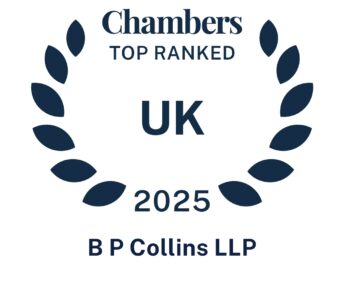In the recent judgment in Hashmi v Lorimer-Wing [2022] EWHC 191 (Ch) (also known as Re Fore Fitness Investments Holdings Limited), the High Court determined that a single director did not have authority to commence a counterclaim where the company’s articles included model articles and a bespoke article regarding quorum for directors’ meetings. The judgment refers to the ongoing debate as to whether the model articles are fit for purpose for sole director companies and the High Court gives its opinion. B P Collins’ corporate and commercial team advises.
Background
Fore Fitness Investments Holdings Limited (Company) was incorporated in February 2019 with unamended model articles for private companies limited by shares and with Mr Lorimer-Wing as sole director and shareholder. Mr Hashmi and Mr Gilbert were later appointed as directors on 20 March 2020. They were also shareholders of the company. On 20 March 2020 the Company adopted new articles, which kept model articles 7 (Directors to take decisions collectively) and 11 (Quorum for directors’ meetings), but also introduced bespoke article 16. In summary, this article stated that the quorum for board meetings was two directors (an Investors’ director and Executive director, if any had been appointed as such).
A TM01 form was filed on 19 April 2021 which stated that Mr Hashmi ceased to be a director on 26 February 2021. Mr Gilbert ceased to be a director on 13 June 2021. Therefore, Mr Lorimer-Wing was again the sole director from 13 June 2021.
The application heard by the High Court arose from proceedings brought by Mr Hashmi, who sought an order against Mr Lorimer-Wing and the Company that Mr Lorimer-Wing purchase his shares in the Company. The Company in its Defence and Counterclaim asserted claims against Mr Hashmi for damages for breach of his duties as a director of the Company, breach of contract and/or pre-contractual misrepresentation and for rescission. In the application, Mr Hashmi sought to strike out the Company’s Counterclaim.
Decision
The High Court struck out the Counterclaim and explained in paragraph 25 that ‘In my view Bespoke Article 16(2) required that at least two directors participate in any decision to commence a counterclaim. At all relevant times Mr Lorimer-Wing was acting as the sole director of the Company. As such he had no power to commence the counterclaim and acted ultra vires in purporting to do so. That, in itself, merits striking out the counterclaim.’
The High Court further explored the model articles and stated obiter that amendment was required for the model articles to permit a single director to run a company. That would need to include the deletion of model article 11(2). The High Court explained its reasoning with reference to Thomson Reuters’ Practical Law and LexisPSL and acknowledged that there is an ongoing debate whether a sole director can run a company which uses model articles:
‘Finally, I should address the extracts from Practical Law and LexisPSL. I did not feel either greatly advanced the Respondents’ case. LexisPSL acknowledges that there is a debate as to the relationship between Model Articles 7(2) and 11(2). The fact that there is debate shows that there is no industry wide consensus in the Respondents’ favour. Although Practical Law was more definitive in saying that Model Article 7(2) should prevail over Model Article 11(2), it also recognised that the Model Articles (notably articles 14 and 15) were not a comfortable fit for single director companies and would often need to be amended. I agree that amendment is required for the Model Articles to permit for a single director to run a company, but consider that such amendment would need to include the deletion of Model Article 11(2). In this case the parties did not delete it; they reinforced it, in the form of Bespoke Article 16(2).’ (para 24)
The High Court explained that it considered bespoke article 16 as a general requirement that required 2 directors to run the Company: ‘A provision in the articles requiring there to be at least two directors to constitute a quorum logically is a requirement that the company in question have two directors in order to manage its affairs. That is the purpose of the meetings. Bespoke Article 16.1 therefore does require there to be two directors and Model Article 7(2)(a) is, by its own terms, disapplied.’ (para 21)
B P Collins’ commentary and advice
This is a decision which highlights the slightly ambiguous drafting of the model articles. However, the judge’s comments on the model articles are still surprising.
As a reminder, it is important to appreciate the intent behind the model articles, which is to provide companies with a set of default articles that cover the key concerns of a business, particularly a small owner managed business. Many of these businesses would only have one director and shareholder and so it would seem logical that the model articles would be suitable for such companies without requiring any amendments.
Previously, it has been understood that model article 7(2) (disapplying the general rule for director decision-making for sole director companies) prevailed over any inconsistent articles regarding directors’ decision-making. However, there has been debate as to whether this is the correct interpretation as model article 7(2)(b) contains the proviso that “no provision of the articles requires it to have more than one director”.
The question that has caused the debate is whether the minimum quorum requirement for directors’ meetings (in model article 11) requires the company to have more than one director. Many had previously interpreted that it would not, because sole directors don’t need to hold “meetings” as it would not make sense for a director to hold a meeting by themselves. Therefore, the approach was that they would be able to rely on model article 7(2) to take decisions and run the business.
It looks like the decision may have turned on bespoke article 16(2). The judge said that this provision equated to a requirement for the company to have 2 directors to manage its affairs (thereby satisfying the proviso in model article 7(2)(b)).
Certainly, it would have been very interesting to know how the judge would have decided if the Company still had unamended model articles.
However, the obiter comments of the High Court at paragraph 24 of the judgment seem to suggest that unamended model articles would need to be adapted to permit a sole director to run a company, even in the absence of a bespoke article such as the bespoke article 16 in this case.
The High Court’s comments are only obiter so are not definitive that sole director companies need to amend their model articles. However, in light of this decision, it could be a safety play for sole director companies to document (by shareholder resolution) the ratification of all decisions previously taken by the sole director and adopt appropriate changes to their articles to amend or disapply model article 11(2). These are relatively straightforward steps that could be taken to reassure sole directors, who may be concerned by the High Court’s comments, that they have the power to run their companies.
For more advice or information on this topic, contact our Corporate and Commercial team on enquiries@bpcollins.co.uk or call 01753 889995.
For more complimentary advice articles from B P Collins to your inbox, please email enquiries@bpcollins.co.uk



















